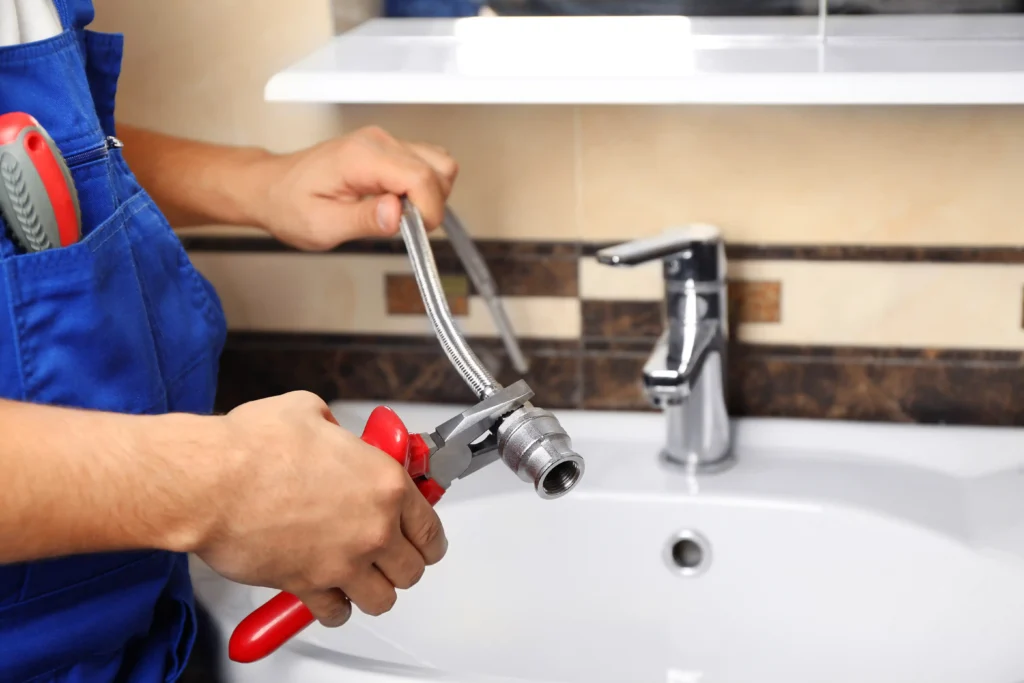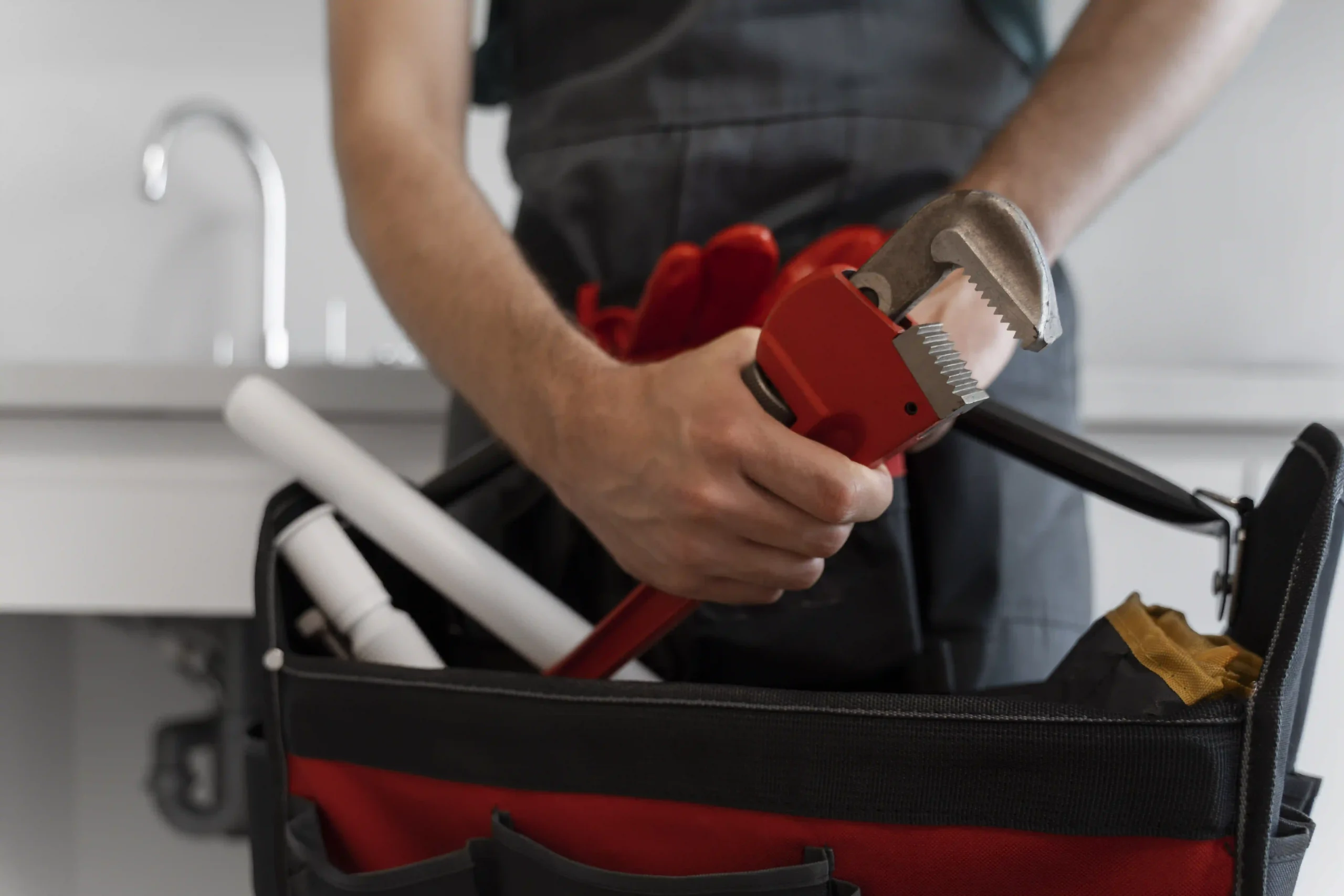Have you ever thought of a plumber as a cartoon character with a plunger? Well, managing Commercial Plumbing in Orange is anything but cartoonish. For businesses in Orange, NSW, plumbing systems can be large, complex, and absolutely crucial for daily operations. A burst pipe or blocked drain can cost time and money, while leaks waste precious water – a major concern under Orange’s water restrictions.
This guide dives deep into what commercial plumbing in Orange really means for businesses like yours. We’ll cover services offered, local regulations, smart technologies, cost expectations, and how to choose the right plumber. By the end, you’ll feel confident about keeping your business’s plumbing running smoothly (and maybe even crack a smile at that cartoon plumber above)!
What Makes Commercial Plumbing Different?
When we say “commercial plumbing,” we mean systems in businesses and public buildings – think restaurants, offices, shops, or warehouses. Unlike your home’s pipes, commercial systems are usually bigger and busier. You might have multiple bathrooms, kitchenettes, laundry facilities, or even industrial equipment hooked up to water and gas.
This scale means commercial plumbing in Orange requires specialized skills and tools: heavy-duty pipe wrenches, pipe relining equipment, pumps, backflow preventers, and even grease traps for restaurants.
Commercial plumbers often need to coordinate with architects, contractors, or city inspectors to meet building codes. In short, running a successful commercial plumbing service in Orange means thinking big – and thinking about every detail from sewer connections to stormwater drains.
Key Services for Orange Businesses
A good commercial plumber is like a Swiss Army knife for business maintenance. Here are the core services you can expect:
- Installations & Renovations: Setting up new systems (sinks, bathrooms, irrigation, hot water) or reconfiguring existing ones during a refit or expansion. Expert plumbers ensure every pipe and fixture is up to code. For example, they might install a high-capacity water heater or reroute piping for a kitchen upgrade.
- Routine Maintenance: Regular checks on drains, water lines, and equipment to prevent problems. This might include flushing drains, inspecting pump efficiency, or replacing worn washers. Think of it as a yearly “health check” for your plumbing. Preventive care helps avoid emergencies down the line.
- Emergency Repairs (24/7): Burst pipe at 2 AM? Sewer blockage before lunchtime? Commercial plumbers often offer around-the-clock service. Having an emergency plumber on call means your business can get fixed ASAP and minimize downtime. (Remember: emergency rates are higher, but they beat a flooded store!)
- Civil & Drainage Work: Larger jobs like connecting to public sewers, installing stormwater drains, or fixing major sewer lines fall here. These tasks usually require special approvals. For example, any new sewer connection in Orange needs Council approval (a Section 68 permit) and must be done by a licensed plumber.
- Water Efficiency Upgrades: Modern businesses often add water-saving fixtures (low-flow toilets, sensor taps) or eco systems (rain tanks, greywater recycling). Plumbers can fit smart leak-detection devices or replace old pipes with more efficient materials. These upgrades save money on bills and help comply with local water restrictions (see below).
In short, commercial plumbers in Orange handle it all: from tightening a loose faucet to designing a complex drainage system for a new factory. They keep your plumbing legal, efficient, and out of your hair.
Local Rules and Licensing: Stay Compliant
Running plumbing work in Orange isn’t just about wrenches – it’s also about following the rules. In NSW, only licensed plumbers may carry out plumbing and drainage work. This means any business project – even a “small” sink install – must be handled by a professional with the right license. If you let an unlicensed person work, you risk penalties and failed inspections.
Moreover, major plumbing projects often need formal approvals. For example, connecting to the public sewer requires an approval from Orange City Council (a “Section 68” permit). Only then can you legally tap into the council’s sewer system.
You can find the official process explained here: Approval to connect to a public drain or sewer – Orange City Council. Similarly, by law you usually must submit a Notice of Work (NoW) to NSW Fair Trading for most plumbing jobs, detailing what will be done and by whom.
Why all this red tape? It’s about safety and consistency. Licensed plumbers are trained in the Australian Plumbing Code and NSW standards, ensuring your installation is safe and up to spec. For instance, they’ll check that gas fittings are sealed properly or that backflow prevention devices are installed if needed (important to keep drinking water clean).

They also carry insurance, which protects you if something goes wrong on the job. Finally, Orange businesses must heed water restrictions and conservation rules. Orange City Council has strict limits on watering gardens and other non-essential water use, with fines up to $2,000 for breaches.
Keeping your commercial plumbing leak-free is not only smart business – it helps you stay on the right side of these rules. (For example, fixing a single leaking toilet can save thousands of litres a year!)
The NSW government also provides business guidance: they warn that water leaks “increase the cost of your water bill” and recommend contacting a plumber immediately if you suspect a leak. In short, running an efficient, compliant plumbing system means lower bills and less risk of fines or damage.
Hidden Threats: Leaks, High Usage & Maintenance
Plumbing issues can sneak up on you. A hidden leak can waste thousands of litres and corrode pipes. Imagine a slow drip behind a wall – you won’t notice it until your water bill spikes or drywall crumbles. According to Australian business advisors, water leaks can cause mold, structural damage and higher bills – “if this happens you should contact a plumber” right away.
Likewise, multiple taps, toilets, or irrigation systems in a commercial setting can drive up usage. A busy restaurant, for example, might have dozens of dishwasher or hose cycles daily. Old or inefficient fixtures add to this. In fact, experts note that outdated toilets and appliances use far more water, so upgrading to WELS-rated fixtures can slash bills (and align with local drought efforts).
To keep surprises at bay, regular maintenance is key. Plumbers recommend scheduling annual inspections and leak checks for businesses. A proactive plumber will use tools like CCTV pipe cameras or acoustic sensors to spot problems you can’t see. By catching a problem early – a hairline crack or a minor clog – you prevent it from becoming an emergency (and save on costly repairs).
As LeakTech advises, it’s “good practice for businesses to schedule regular leak detection checks” to address minor issues before they escalate. In practical terms, this might mean having a plumber in to audit drains and test pressures each year, or fitting a smart leak detector on the main pipe that alerts you to anomalies.
Common Issue and Solutions
- Blocked Drains: Commercial kitchens or bathrooms often face blockages from grease or debris. A plumber might use high-pressure hydro-jetting or mechanized snakes to clear lines quickly.
- Burst Pipes: In cold snaps, pipes can freeze and burst. Plumbers can insulate critical lines or provide constant-pressure systems to prevent freeze-ups. If a burst happens, emergency response is needed.
- Backflow Prevention: Businesses that mix chemicals or have irrigation systems may need backflow valves to protect the water supply. Plumbers install and test these valves to meet NSW requirements.
- Water Hammer: The loud banging in pipes can signal pressure issues. A commercial plumber can add air chambers or pressure-reducing valves to stop it.
By addressing these issues swiftly, your business avoids downtime, health hazards, and wasted water. As one local cafe owner quipped, “The plumber saved our morning rush once – a small leak turned out to be a crack in the sewer line!” Having an experienced plumber on retainer (or at least on speed-dial) is common practice for savvy businesses.
Smart, Sustainable Trends in Plumbing
Commercial plumbing isn’t stuck in the 1950s – today’s trends are about saving money and the planet. In Orange’s climate (with its seasons and occasional droughts), many businesses are adopting green plumbing practices. For example, installing smart leak detectors and sensor taps means water only flows when needed.
Some companies even integrate rainwater tanks or greywater recycling: wash and shower water (greywater) can be treated onsite and used for toilet flushing or landscape irrigation. This slashes mains-water use – crucial under water restrictions – and those systems often get government rebates.
Plumbers are also using new materials and tech. UV water purifiers and reverse-osmosis systems can give businesses clean water onsite, useful for labs or cafes. Also, 3D printing of custom pipe fittings is an emerging trend, letting plumbers create parts quickly for odd repairs (though this is more future-tech).
Finally, energy-efficient heating is part of the picture. Tankless or solar hot water systems for large hot water demand (think hotels or hospitals) are becoming commonplace. A plumber in Orange might install a solar hot water system on a restaurant roof, cutting gas use in winter.
In a nutshell, the modern commercial plumber is part plumber, part efficiency consultant. Expect your plumber to discuss things like Water Efficiency Labelling (WELS) ratings and maybe even upload your water meter readings to an app. It may sound overkill, but in the age of tight budgets and regulations, these high-tech measures keep businesses compliant and costs low.
Choosing the Right Commercial Plumber
How do you pick a reliable plumber among all the options? Here are some friendly tips:
- Check credentials: Make sure your plumber is licensed in NSW and insured. Ask for their license number (plumbers must display it on quotes).
- Experience with businesses: Commercial plumbing is a specialty. Look for firms that list schools, offices, restaurants or factories among their clients. They know business-size systems and codes.
- Local knowledge: A plumber who works often in Orange will know local quirks – for example, water quality (hardness), local council rules, or seasonal issues. They might even have a rapport with council inspectors (always helpful!).
- 24/7 availability: Emergencies don’t wait. Choose someone who offers 24-hour service or guarantees a fast response time.
- Transparent quotes: Ask for a written quote with breakdown of parts, labor, emergency fees, etc. Understand what you’re paying for.
- References and reviews: Word-of-mouth is gold. Talk to other Orange businesses or look for online reviews. A plumber with good reviews and repeat clients is likely trustworthy.
For instance, a co-working space owner might say: “Our plumber in Orange was recommended by the local trades council. He knew exactly how to navigate our council approvals and got it done fast.” Those local referrals can be priceless.
Costs and Budgeting
Cost is always on a business’s mind. Plumbing rates can vary widely by job size, time, and complexity. To give you a ballpark, here are some typical costs (AUD) for common plumbing services:
- Annual Inspection & Maintenance: $200–$400 for a full check-up (plus any repair parts).
- Drain Cleaning (per blockage): ~$150–$300 for standard blockages (e.g. grease or hair clogs, using drain snake or jet).
- Leak Detection & Repair: $100–$500, depending on severity. Simple leaks (loose tap or joint) are cheaper; hidden leaks needing cameras or wall cuts cost more.
- Faucet/Toilet Servicing: $75–$200 per fixture (tightening, washer replacement, etc.). Preventative maintenance on faucets or toilets falls here.
- Emergency Call-Out: $100–$200 just to have the plumber show up (often higher after-hours).
- Hourly Rate (Plumbing Labor): Typically $150–$300 per hour for commercial jobs, again higher for emergencies or odd hours.
- New Fixture Installation: $150–$300 per tap; $300–$600 for a toilet; $500–$1,000+ for a shower, depending on brand and complexity. Large installations (like a hot water system) can run $1,200–$4,000.
For budgeting, consider this: one small leak repair might be just $100 today, but a broken main pipe replacement could be thousands. It’s wise to have a contingency fund or maintenance plan for plumbing in your annual budget. Some businesses set aside 1–2% of their building maintenance costs for plumbing surprises.
| Service | Typical Cost (AUD) |
|---|---|
| Annual Inspection (commercial) | $200–$400 |
| Drain Cleaning (jetsnake) | $150–$300 |
| Leak Detection & Repair | $100–$500 |
| Faucet/Toilet Servicing | $75–$200 |
| Emergency Call-Out Fee | $100–$200 (plus higher rates) |
| New Tap Installation | $150–$300 |
| New Toilet Installation | $300–$600 |
| Hot Water System (installed) | $1,200–$4,000 |
Table 1 – Representative costs for common commercial plumbing services in Australia (prices can vary by project scope and location).
Remember, these are ballpark figures. An exact quote from a local Orange commercial plumber is the gold standard. And as always, cheaper isn’t always better: going with the cheapest bid can backfire if quality or compliance is cut corners.
Keep Your Business Flowing
In sum, Commercial Plumbing in Orange is a serious business. It goes beyond unclogging toilets – it means designing, maintaining, and safeguarding the complex water and drainage systems that businesses rely on.
By staying proactive (regular maintenance, watching for leaks) and choosing skilled licensed plumbers, you protect your bottom line and the environment. With drought and water restrictions a reality in Orange, efficient plumbing is not just a convenience; it’s a responsibility.
So the next time a tap drips or a toilet backs up, remember: fixing it quickly isn’t just smart, it’s essential. Keep a trusted plumber’s number handy, and don’t hesitate to use modern solutions (like sensors or water recycling) when updating your facilities. A well-run plumbing system is like a hidden asset – it quietly keeps everything running while you focus on your business.
Feel free to reach out to local Orange plumbing experts or city resources (like the Orange City Council) for advice on approvals and best practices.
Now over to you: Have questions about commercial plumbing in your Orange business? Consider chatting with a licensed plumber today to stay compliant and efficient. A small call could save thousands later!
FAQs
Do I need a special license to run plumbing in my business building?
Yes. In NSW, any plumbing or drainage work on a commercial property must be done by a licensed plumber.
How often should I schedule plumbing maintenance?
Experts recommend at least an annual check-up for commercial systems. High-use businesses may want twice a year to catch issues early.
What if I have a plumbing emergency after hours?
Look for a 24/7 commercial plumber in Orange. Emergency rates are higher, but they minimize downtime.
Can I install water-saving fixtures myself?
You can buy them, but installation should be done by a licensed pro to ensure compliance and warranty.
Will fixing leaks really save money?
Absolutely. A single leak can waste thousands of liters and bump up your water bill. Prompt repair saves water and cash.

